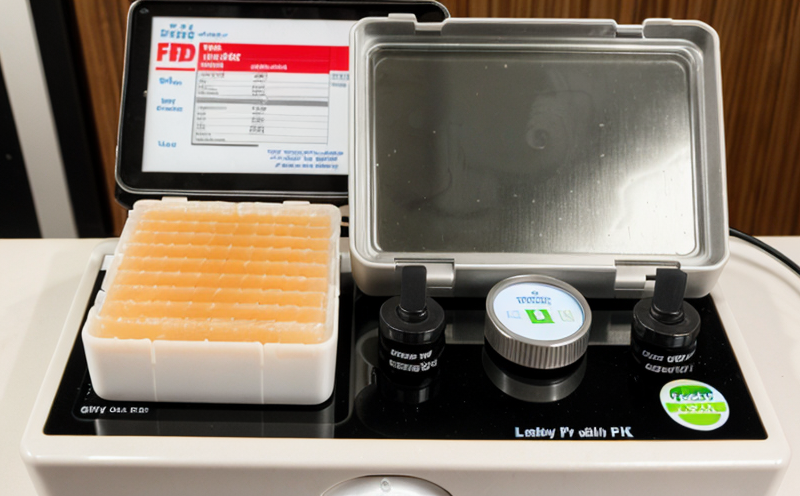EN 16540 Fatty Acid Testing in Fortified Cereal Products
The European standard EN 16540 provides detailed guidelines for the determination of fatty acid profiles in fortified cereal products. This service is essential for ensuring that food and feed manufacturers adhere to strict quality control standards, meet regulatory requirements, and provide accurate nutritional information to consumers.
Fortified cereals are a popular choice among consumers seeking health benefits from their diets. These products are often enriched with vitamins, minerals, or other nutrients aimed at improving overall nutrition. However, the addition of these components can also alter the lipid profile significantly, making it crucial for manufacturers to monitor and report these changes accurately.
The fatty acid composition of fortified cereals is not only important from a nutritional standpoint but also plays a role in determining their stability, shelf life, and safety. A comprehensive analysis using EN 16540 helps companies ensure they are delivering products that meet both regulatory expectations and consumer needs.
Our laboratory adheres strictly to the procedures outlined in EN 16540 for this testing service. This includes thorough sample preparation, precise analytical techniques, and rigorous quality control measures. The results obtained from these tests serve as valuable data points for R&D departments, compliance officers, and quality managers alike.
Understanding the fatty acid profile of fortified cereals is particularly relevant when considering specific applications such as infant formulas or dietary supplements. For instance, certain essential fatty acids like linoleic acid (LA) and alpha-linolenic acid (ALA) play critical roles in brain development and function. Ensuring these are present at appropriate levels ensures the product meets health claims made by manufacturers.
Moreover, compliance with EN 16540 is becoming increasingly important due to growing consumer awareness about dietary preferences and health concerns. Many consumers now seek out fortified cereals specifically designed for special diets or those looking to boost their intake of certain nutrients. By offering accurate fatty acid profiles based on this standard, laboratories can help ensure that these products meet rigorous quality standards.
For manufacturers aiming to expand into international markets, compliance with EN 16540 adds significant value by demonstrating adherence to recognized European standards. This can enhance credibility and trustworthiness among potential customers while also paving the way for smoother regulatory approvals in various countries.
Scope and Methodology
| Test Parameters | Description |
|---|---|
| Total Fatty Acid Content | Quantification of all fatty acids present in the sample. |
| Individual Fatty Acids Identification | Detailed profiling of each specific type of fatty acid within the product. |
| Lipid Stability Indicators | Evaluation of factors affecting lipid stability over time and storage conditions. |
The methodology involves several key steps:
- Sample preparation: Properly grinding and extracting the fatty acids from fortified cereal samples.
- Analytical techniques: Utilizing advanced chromatographic methods to separate and identify individual fatty acid components.
- Data interpretation: Comparing obtained data against established reference values provided by EN 16540.
This approach ensures accurate, reliable results that reflect the true composition of fortified cereals undergoing analysis.
International Acceptance and Recognition
EN 16540 has gained widespread acceptance across Europe as a trusted benchmark for fatty acid testing in fortified cereal products. Its adoption reflects the growing emphasis on standardized methods within the food industry, particularly regarding nutritional content claims.
The standard's rigorous criteria ensure consistency and accuracy in test results, which is essential given the diverse range of fortified cereals available today. Manufacturers who adopt EN 16540 not only enhance their reputation but also position themselves favorably for export to countries where such standards are increasingly being implemented.
Furthermore, compliance with this standard can contribute positively towards achieving certification from recognized bodies like BRC Global Standards or FSSC 22000. These certifications indicate adherence to high-quality practices throughout the supply chain, further boosting brand image and marketability.
Competitive Advantage and Market Impact
- Informed Decision Making: Provides clear insights into product quality and performance.
- Regulatory Compliance: Ensures that products meet stringent legal requirements, reducing the risk of non-compliance penalties.
- Consumer Trust: Demonstrates commitment to producing safe, high-quality fortified cereals.
- Innovation Support: Facilitates ongoing research into optimizing nutrient profiles and improving product stability.
The ability to offer EN 16540-compliant fatty acid testing services positions our laboratory as a leader in the field. It allows us to support clients in making informed decisions about their products, ensuring they stay ahead of evolving regulatory landscapes and consumer expectations.





